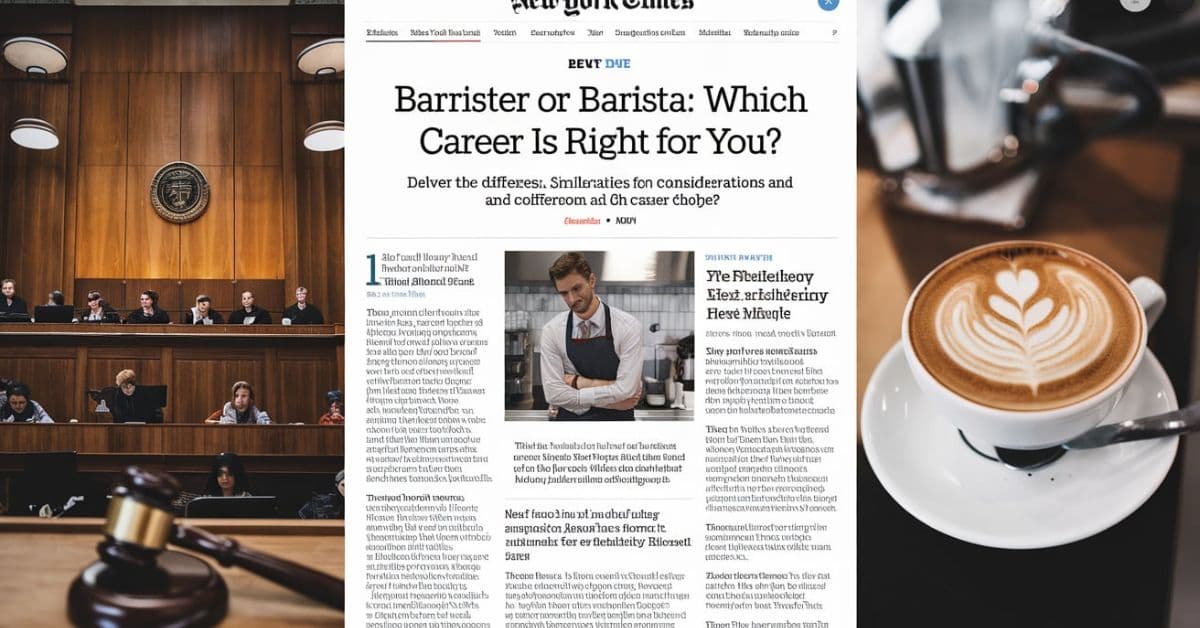Barrister or Barista NYT: Choosing the Right Career Path for You
Choosing a career can be one of the most important decisions in a person’s life. When it comes to the terms “Barrister or Barista NYT,” it’s essential to understand the nuances between these two seemingly different professions. Each path offers unique challenges and rewards. This article will delve deeply into the differences, similarities, and considerations for each career choice, ensuring you have all the information you need to make an informed decision.
Understanding the Terms: Barrister vs. Barista
Before we dive into the details, let’s clarify what each term means:
- Barrister: A barrister is a legal professional who represents clients in court. They are often involved in advocacy, providing legal advice, and drafting legal documents. Barristers typically specialize in a particular area of law, such as criminal law, family law, or corporate law.
- Barista: A barista is a coffee shop worker who prepares and serves coffee drinks. This role can involve various tasks, from brewing espresso to creating latte art. Baristas often work in fast-paced environments and engage with customers directly.
While these professions may seem worlds apart, they both offer unique opportunities for personal and professional growth.
Key Differences Between a Barrister and a Barista
Understanding the differences between a barrister and a barista can help you make a more informed career choice.
Education and Training
Barrister
Becoming a barrister requires significant education and training. Here are the typical steps:
- Obtain a Bachelor’s Degree: Most barristers begin with a degree in law, although other subjects may be accepted if followed by a law conversion course.
- Complete Bar School: After obtaining a law degree, aspiring barristers must attend a Bar school to receive specialized training in advocacy and legal practice.
- Pupillage: This is a period of practical training that involves shadowing an experienced barrister. Pupillage can last for up to one year and is crucial for gaining practical experience.
- Bar Qualification: Finally, aspiring barristers must pass a series of assessments to qualify as a practicing barrister.
Barista
Becoming a barista requires far less formal education:
- Minimum Education: Generally, a high school diploma is sufficient for most barista positions.
- On-the-Job Training: Many coffee shops provide training for new baristas, teaching them how to operate coffee machines, prepare drinks, and provide customer service.
- Experience: While formal training isn’t necessary, experience in food service or hospitality can be beneficial.
Work Environment
Barrister
Barristers typically work in legal chambers or law firms, where they prepare cases and meet with clients. Their work environment can be intense, often requiring long hours, especially when preparing for a trial.
Barista
Baristas work in coffee shops, cafes, and restaurants. The work environment is generally more relaxed compared to that of a barrister, but it can still be fast-paced, especially during busy hours.
Job Responsibilities
Barrister
A barrister’s primary responsibilities include:
- Representing clients in court
- Drafting legal documents
- Researching legal precedents
- Providing legal advice to clients
Barista
Baristas have varied responsibilities, such as:
- Preparing and serving coffee and other beverages
- Maintaining cleanliness and organization in the café
- Engaging with customers and providing excellent service
- Handling cash and managing inventory
Salary and Job Outlook
Barrister
According to the U.S. Bureau of Labor Statistics (BLS), the median salary for lawyers, including barristers, was approximately $126,930 in 2022. The job outlook is positive, with an expected growth rate of about 4% from 2021 to 2031, reflecting the continued demand for legal services.
Barista
The median hourly wage for baristas is around $14.00, but tips can significantly boost earnings. The job outlook for baristas is also positive, especially as coffee culture continues to thrive in the U.S. However, this role may offer less job security compared to a legal career.
Personal Satisfaction and Lifestyle
Barrister
Working as a barrister can be incredibly rewarding, particularly for those passionate about law and justice. However, the demands of the job may lead to a challenging work-life balance. Many barristers work long hours, which can impact personal time.
Barista
Being a barista can be fulfilling for those who enjoy social interaction and working in a creative environment. The role offers more flexibility in scheduling, which can contribute to a better work-life balance. However, it may not provide the same level of financial security or career advancement opportunities as a legal career.
Factors to Consider When Choosing Between Barrister and Barista
Passion and Interests
Your interests should play a crucial role in your decision. If you have a passion for law and advocacy, a career as a barrister may be more satisfying. Conversely, if you love coffee culture and enjoy working with people, being a barista might be a better fit.
Financial Goals
Consider your financial aspirations. A career as a barrister typically offers higher earning potential, while being a barista may provide more immediate, though lower, financial rewards.
Work-Life Balance
Think about the kind of lifestyle you want. If you value flexibility and a social work environment, barista roles may suit you better. However, if you are willing to dedicate time and effort for a potentially high-paying career, pursuing a barrister path could be worthwhile.
Job Stability and Growth
Research the job market in your area. Barristers may have more stable career prospects, while barista jobs can be plentiful but may also be more susceptible to economic downturns.
Frequently Asked Questions (FAQs)
1. What is the primary difference between a barrister and a barista?
The main difference lies in their professions: a barrister is a legal professional who represents clients in court, while a barista is a coffee shop worker who prepares and serves coffee drinks.
2. How long does it take to become a barrister?
Becoming a barrister typically takes at least seven years, including a bachelor’s degree, bar school, and a year of practical training (pupillage).
3. Is a law degree necessary to become a barista?
No, a law degree is not required to become a barista. A high school diploma is usually sufficient, and most training occurs on the job.
4. What is the salary difference between a barrister and a barista?
As of 2022, the median salary for lawyers (including barristers) is around $126,930, while baristas earn about $14.00 per hour, plus tips.
5. Which career path offers better job stability?
Barrister positions generally offer better job stability and growth potential compared to barista roles, which can be more susceptible to market fluctuations.
6. Can I pursue both careers at different times in my life?
Yes, many people change careers throughout their lives. If you start as a barista, you can later pursue a law degree and become a barrister if that aligns with your interests.
Conclusion
Choosing between a career as a barrister or a barista involves careful consideration of your interests, values, and lifestyle preferences. Both paths offer unique rewards and challenges. By understanding the differences and what each profession entails, you can make an informed choice that aligns with your career aspirations. Whether you find yourself in the courtroom advocating for justice or crafting the perfect cup of coffee, both careers have the potential to be fulfilling and rewarding. Remember, the best path for you is the one that resonates with your passion and goals.






